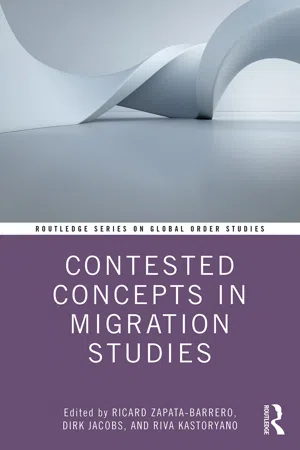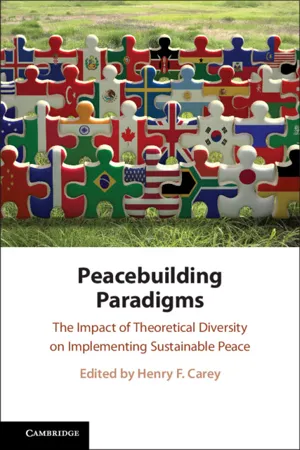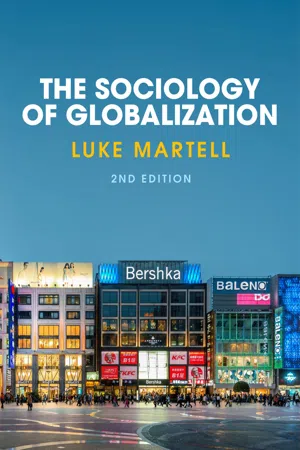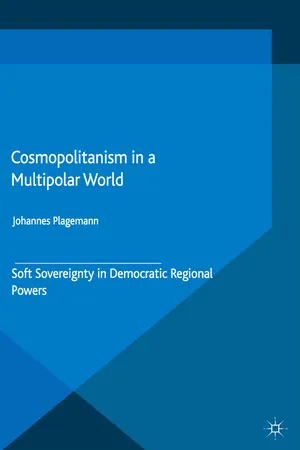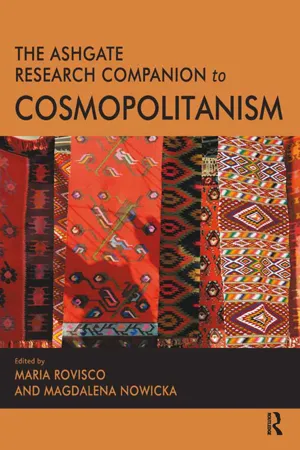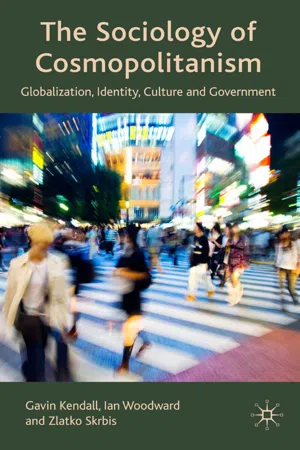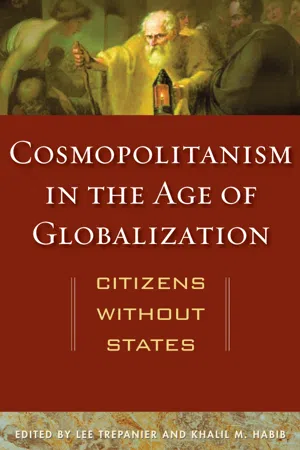Politics & International Relations
Cosmopolitan Multiculturalism
Cosmopolitan multiculturalism refers to a perspective that embraces diversity and promotes the coexistence of different cultures within a society. It emphasizes the idea of global citizenship and the recognition of shared humanity across national and cultural boundaries. This approach seeks to foster understanding, respect, and cooperation among people from diverse backgrounds.
Written by Perlego with AI-assistance
Related key terms
1 of 5
11 Key excerpts on "Cosmopolitan Multiculturalism"
- eBook - PDF
Cosmopolitanisms
New Thinking and New Directions
- Robert J. Holton(Author)
- 2017(Publication Date)
- Red Globe Press(Publisher)
For what comes into focus, if we start from Kumasi, is Islamic cross-border globalization and the long history of migration and re-settlement, as much as Western imperialism and colonization. In this sense, it is preferable to analyse cosmopolitanism as a range of practices and institutions that very often transcend the divides between West and East (Delanty, 2006c). Has globalization created such a profound new inter-dependence of peoples across political and cultural boundaries, that the human con- dition has now become cosmopolitan (Beck, 2006)? To the extent that it has, is this now a foundation for a new cosmopolitan politics and ethics that might create enduring cosmopolitan law and governance (Held, 1995)? Or is cosmopolitanism rather more sharply circumscribed limited to some social groups rather than others? Does cosmopolitan- ism take different forms in different locations? To the extent that it does, is there one basic template for cosmopolitanism or is it multiformed and varied? And if so, what common features lie behind the variety? Cosmopolitanism is therefore a live issue in a number of inter- related senses. In a practical sense it is concerned with how we live our daily life in the face of the many human challenges created by the cross-border mobilities and inter-dependencies brought about by globalization, while in a more philosophical or theoretical sense it has re-emerged as a major preoccupation amongst scholars and thinkers engaged with questions as to the direction of social change and the possibility of creating a global political community of citizens able to engage with social inequalities, cultural conflicts and political instabilities of the early 21st century. The possibility and desirability of cosmopolitanism have provoked major debates not only among philo- sophers and historians, but sociologists, anthropologists, geographers, political scientists and academic lawyers. - eBook - ePub
- Ricard Zapata-Barrero, Dirk Jacobs, Riva Kastoryano, Ricard Zapata-Barrero, Dirk Jacobs, Riva Kastoryano(Authors)
- 2021(Publication Date)
- Routledge(Publisher)
4
Cosmopolitanism
Moral universalism and the politics of migration
John Erik Fossum and Espen D.H. OlsenDOI: 10.4324/9781003119333-51 Introduction
This chapter analyzes cosmopolitanism from the vantage-point of ‘reflexive conceptual knowledge’, as the editors define it. Concepts are far from neutral, and the meaning they are ascribed and the use to which they are put are privy to a range of factors within and beyond the scientific field. For instance, concepts are shaped by the manner in which research is conducted and how analysts frame the objects they study. Concepts are socially constructed. They therefore do not operate in a political and ideological vacuum; they are shaped by ongoing political and ideological discourses and the contexts within which the discourses are conducted. All these factors have bearings on our conception of cosmopolitanism. In presenting this core term in more detail, we take into consideration the editors’ observation to the effect that concepts are ideology dependent, policy/politics dependent, context dependent, discipline dependent, and language dependent.In the following, we start by outlining cosmopolitanism’s different traditions and meanings over time. Cosmopolitanism has deep historical roots and has come in various shapes: as a moral theory; an ethical stance; a special version of democracy (cosmopolitan democracy); and a way of life (Holton, 2009 ). Tracking its different usages over time underlines the important structuring effects of different types of context. One such context is intellectual and refers to how cosmopolitanism has become privy to increased academic specialization and the distinct ways of seeing that mark the academic traditions that have shaped cosmopolitanism: (moral) philosophy, the history of ideas, political science, law, and sociology. Some analysts underline in particular the central role of cosmopolitan law, which ‘may well be its most crucial indicator’ (Holton, 2009 : 198). Nevertheless, as we will show in this chapter, there is a relatively stable core. Cosmopolitanism’s structuring normative intuition is moral universalism (Habermas, 1997 , 2006 - eBook - PDF
Peacebuilding Paradigms
The Impact of Theoretical Diversity on Implementing Sustainable Peace
- Henry F. Carey(Author)
- 2020(Publication Date)
- Cambridge University Press(Publisher)
It is not adverse to such liberal initiatives as “Alliance of Civilizations” (the Spanish-Turkish UN sponsored project) as a way of affirming human identity while embracing cultural and other forms of diversity. Cosmopolitanism more than other perspectives is concerned with reconciling unity with difference, through mutual understanding of otherness, and a celebration of diversity, and an embrace of universal values and identity. In this regard realism disavows unity as attainable or desirable (except in certain imperial formations or geopolitical hierarchies), while liberalism tends to affirm tolerance and hospitality as ways to humanize the oper- ations of state-centric world order. Without losing this focus on what is globally required to serve the human interest, it is important for cosmopolitan traditions of thought to learn from critical theorists, especially with regard to the importance of context, ontological changes, ecological 21 See, for example, Raymond Aron’s argument about prudence as the cardinal virtue of realist statecraft in Raymond Aron, Peace and War: The Theory of International Relations (Garden City, NY: Doubleday, 1966). 22 See the Kissinger reviews of his World Order in Millennium. 23 Anne-Marie Slaughter, The New World Order (Princeton, NJ: Princeton University Press, 2004). 158 Richard A. Falk challenges, and the multiplicity of strategies and conceptions of emancipatory political thought and action. Learning from realists is also important to convey the relevance of structure and power to the formation of policy. Whether “cosmopolitanism” is a sufficiently “cosmopolitan” name remains an open question in my mind. - eBook - ePub
- Luke Martell(Author)
- 2016(Publication Date)
- Polity(Publisher)
In this chapter and the next I will look at two main types of global politics. The first is cosmopolitan democracy and involves the establishment of political institutions at an international level in a cosmopolitan form (for a shorter article on the themes of this chapter see Martell 2011). This focuses mostly, but not entirely, on formal political institutions that can be set up globally, and is often fired by social democratic and liberal impulses to counter or regulate global neoliberalism and attack problems such as world poverty, conflict and abuses of human rights. The focus here is on political cosmopolitanism. Cultural cosmopolitanism is raised in other chapters, for instance in discussions of cultural hybridization.This chapter looks critically at cosmopolitanism but also looks for positive bases for its success. I wish to break away from polarized arguments either for or against cosmopolitanism. Material interests may be the key to both critical and positive approaches to cosmopolitanism, seeing where its problems are but also where it might succeed. The debate on cosmopolitanism can be quite divided. Those who have mixed feelings tend not to have a very analytical basis for dealing with this ambiguity. Supporters who see ambiguities in cosmopolitanism but want to continue with it may acknowledge problems but put their faith in hope and strength of vision to overcome them (e.g., Fine 2006; Archibugi 2004).Fine (2006), for instance, talks about cosmopolitanism that combines an awareness of violence in the world with a normative vision of peace, and sees it providing a mode of understanding as much as a legal and institutional order (p. 49). He argues for keeping in mind the normativity of cosmopolitanism in the face of violence (p.51). Fine endorses Kant’s view that cosmopolitanism is right even if the public and state are not cosmopolitan (p. 52) and Arendt’s argument for taking bearings from the idea of cosmopolitanism rather than its actuality (p. 58). Similarly, Archibugi argues that in the face of the obstacles and reality confronting cosmopolitanism, it should be defended on the basis of being visionary (2004: 452, 454). In short, both authors argue for maintaining cosmopolitanism as a hope or ideal even if reality seems to be going against it. - eBook - ePub
The Stranger as My Guest
A Critical Anthropology of Hospitality
- Michel Agier, Helen Morrison(Authors)
- 2021(Publication Date)
- Polity(Publisher)
These people would also describe themselves as ‘cosmopolitans’, but, to be more accurate, it will be observed that, in their case, this is already a matter of asserting a political position vis-à-vis the world and its governance that is largely representative, democratic or universalist. We are already in the realm of ‘cosmo politics ’, where the philosophy of world politics has a role to play, as we have seen so far. Finally, in a similar vein but moving from world politics to a somewhat less precise conception of the ‘global society’, Ulrich Beck, the sociologist of cosmopolitanism, believed that being cosmopolitan meant having a ‘cosmopolitan consciousness’. He refers to the communal perception of shared risks, for example those related to health, which can occur at any point on the planet and simultaneously. This is the ‘risk society’: avian flu, tsunami, 11 September, terrorist attacks … 19 On such occasions, appeals are being made to our consciousness from all directions at the same time. The sociological point of view becomes the norm when Beck argues that cosmopolitanism is a state of ‘awareness’ that challenges both the ‘hierarchical subordination’ between cultures and civilisations and the ‘dissolution of differences’. The cosmopolitan individual would be someone who accepts differences, otherness, and the need for a power beyond the nation-state. These three most widely accepted usages of the word and the concept of cosmopolitanism (global class, cosmopolitics, world consciousness) do not, however, really describe the cosmopolitan condition in the sense of something experienced in a day-to-day, ordinary way, an experience of the world no matter how unequal or how violent it may be. It is the experience of border situations in the broadest sense that, in my view, enables us to grasp another conception of cosmopolitanism - eBook - ePub
<i>Anyone</i>
The Cosmopolitan Subject of Anthropology
- Nigel Rapport(Author)
- 2012(Publication Date)
- Berghahn Books(Publisher)
The no-longer-sovereign state is faced with a vast array of networks and organizations established to regulate international and transnational activity, David Held (2000) explains, and this can be viewed as the birth of a normative cosmopolitanism. It also signals a shift from singular, central government to ‘multi-level governance’: layered systems of power and authority at a number of levels and sites which function both as a territorial division of government and as a process of checks and balances (Jones 2001: 229). The variety of political and legal arrangements also serve to secure the citizen a diversity of entitlements. The institutions cross-cut and need not be seen as subordinate one to another or even as beholden to one overarching institutionalism.In practical terms, one can imagine there being a global citizenship as well as national citizenships. One can describe there being a fundamental duty owed to the human whole while not insisting this is an exclusive duty (Sen 1996). At the same time, the state is regulated to the extent that there are supranational procedures for grievances. There are different sites of a comparable level of importance and power, all of which promote a sense of global belonging and cosmopolitan rights, and none of which has exclusive claim to being the fount of freedom.Cosmopolitan Politesse
If global governance refers to formal procedures by which cosmopolitan norms may be constitutionally instituted, and by which Anyone is to be everywhere assured of human rights and freedoms, then cosmopolitan norms should also compass the informal. One hopes for a kind of politeness or set or manners by which Anyone might be everywhere recognized as themselves, an individual human being, and admitted into interaction on this basis. One might name this interactional ethos and style ‘cosmopolitan politesse’.Cosmopolitan politesse is a proportionate figure: it attempts a very difficult balancing act, on a global scale. Cosmopolitanism cherishes the capacity of Anyone to make sense for themselves and to fill their lives with personal value, and it celebrates the diversity that ensues: the variety of what individuals will choose for themselves when at liberty. It is a global liberalism which denies communitarian notions of society where all are constrained to accept a common framing of the aims of life. Social structures should not constrain individuals beyond what is necessary to enable their ongoing assemblage and free expression. - eBook - ePub
Cosmopolitanism in a Multipolar World
Soft Sovereignty in Democratic Regional Powers
- J. Plagemann(Author)
- 2015(Publication Date)
- Palgrave Macmillan(Publisher)
already have for individuals globally.In contrast to the moral cosmopolitan’s focus on ideal theory and the sociological cosmopolitan’s preoccupation with empirical processes of change on the individual level, for the political scientist, democratic cosmopolitanism 19 is the natural field of research and expertise:Democratic cosmopolitanism bills itself as a political response to the acknowledged fact of globalization. Unlike its neo-liberal counterpart, however, it does not see globalization as a natural like and self-regulating phenomenon. As an ideal, democratic cosmopolitanism represents the reluctance of politics to capitulate in the face of the so-called ‘spontaneity’ of global economic competition. [ ... ] Cosmopolitans make their case in the name of citizenship, not simply of humanity. And they propose cosmopolitan political institutions in the name of citizenship as a status, not simply as a symbolic or moral value. (Urbinati, 2003, p. 68)Democratic or political cosmopolitans explore functionally adequate and politically legitimate social institutions as a response to global transformations. At the core of their concern is the question how democratic processes can be extended from the – in this sense – uniquely successful but increasingly dysfunctional democratic nation-state to wider units of social interaction.In this undertaking, democratic cosmopolitans rely on the normative underpinnings of moral cosmopolitan thinking. With reference to John Rawls, David Held describes the purpose of democratic cosmopolitanism accordingly: ‘The aim of modern cosmopolitanism is the conceptualization and generation of the necessary background conditions for a “common” or “basic” structure of individual action and social activity’ (2009, p. 539). Its proponents, such as Jürgen Habermas, Otfried Höffe, and James Bohman, have a Kantian starting point: ‘The moral justification for a global democratic order is derived from the Kantian premise that a degree of association among the peoples of the world is needed to protect human rights and successfully oppose their violation’ (Urbinati, 2003, p. 70). Although democratic cosmopolitans share the Kantian belief that the cosmopolitan project is essential for moral reasons and embrace the introduction of a morally relevant transnational sphere, they regard Kant’s conclusion that a world state would unavoidably end in despotism as unsatisfying. Instead, they seek to develop original concepts of how politics can be institutionalized beyond the nation-state. Thus, on a normative level, political cosmopolitans seek to limit, weaken, or abolish the principle of national sovereignty (Kleingeld, 1997, p. 335), as do most moral cosmopolitans. Moreover, they are united by the empirical - eBook - PDF
Just and Unjust Interventions in World Politics
Public and Private
- C. Lu(Author)
- 2016(Publication Date)
- Palgrave Macmillan(Publisher)
The One and Many Faces of Cosmopolitanism 87 in world politics. A cosmopolitan ethic is commonly understood to refer to a universalistic morality that eschews parochial, especially national, limi- tations or prejudices. 6 More positively, a cosmopolitan ethical perspective entails the acknowledgement of some notion of common humanity that translates ethically into an idea of shared or common moral duties towards others by virtue of this humanity. 7 H.C. Baldry refers to it as an 'attitude of mind' centered on the notion of human unity. 8 Martha Nussbaum defines a cosmopolitan as someone 'whose primary allegiance is to the community of human beings in the entire world.' 9 The universality and generality 10 of a cosmopolitan ethical orientation ultimately have their roots in a universalist conception of the right and the good. As Nuss- baum states elsewhere in her influential article, the cosmopolitan stance asks us 'to give our first allegiance to what is morally good - and that which, being good, I can commend as such to all human beings.' 11 Cosmopolitanism so conceived as ethical universalism presents a clear and provocative challenge to the ethical particularism of national and other more parochial sources claiming our moral allegiance. Critics find radically diverse faults with the cosmopolitan perspective. As part of our goal to understand cosmopolitanism, it may be fruitful to examine the points of contention between it and its competing perspec- tives. I will be especially concerned with the challenges posed by realist and communitarian perspectives. Realists regard cosmopolitan claims as too optimistic for a divided humanity, while communitarians generally find them too threatening to key moral goods, such as communal autonomy and plurality. A cosmopolitan perspective is thus at best utopian, and at worst dangerous, for imperfect and diverse humanity. - Maria Rovisco, Magdalena Nowicka, Maria Rovisco, Magdalena Nowicka, Magdalena Nowicka(Authors)
- 2016(Publication Date)
- Routledge(Publisher)
The progressive implications of a cosmopolitanism arising from the social experience of global cities—a cosmopolitan corporate work culture, the sophisticated consumption patterns of this high-income bracket, and the global culture of its growing immigrant population from the Third World—who are needed to support the lifestyle of the former group—is, however, dubious. The cosmopolitanism of corporate workers is essentially the cosmopolitanism of a new technocratic professional class whose primary aims in life are profit-making and conspicuous consumption. The only feelings of solidarity manifest here are to the global firm as a terrain for professional self-interest and advancement. This type of attachment is gradually disseminated throughout the world through the global outsourcing of white-collar jobs, which in turn establishes more bridges for higher-end South–North migration.Similar questions should be raised about the cosmopolitanism of transnational underclass migrant communities in the North. Contemporary studies of global culture that focus on postcoloniality often connect this kind of cosmopolitanism to the political culture of human rights activism as evidence of the post-national spatialization of politics. For example, Arjun Appadurai has grouped transnational NGOs and philanthropic movements, diasporic communities, refugees, and religious movements under the rubric of actually existing “postnational social formations,” arguing that these organizational forms are “both instances and incubators of a postnational global order” because they challenge the nation-state and provide non-violent institutional grounding for larger-scale political loyalties, allegiances, and group-identities (1993: 421). It is claimed that these global social and political movements emanate from the grassroots level and exhibit autonomy from dominant global economic and political forces (“grassroots globalization” or “globalization from below”) and that they can be the sustaining basis for transcending or overcoming the constraining discourse of nationalism/statism (Appadurai 2000).The connection between transnational migrant experiences of global cultural diversity and institutionalized forms of cosmopolitan solidarity, however, remains largely unelaborated. The world is undoubtedly interconnected and transnational mobility is clearly on the rise. But this does not inevitably generate meaningful cosmopolitanisms in the robust sense of pluralized world political communities. One should cast a more discriminating eye at the various emergent forms of cosmopolitanism and distinguish them in terms of how they are connected to the operations of neoliberal capital. For instance, over and above interventions on behalf of underprivileged migrant minority groups on an ad hoc basis, to what extent can activist cosmopolitanisms take root in the latter in a consistent manner to generate a genuinely pluralized mass-based global political community within the Northern constitutional nation-state as distinguished from the defensive identity politics of ethnic, religious, or hybrid minority constituencies? Can these cosmopolitanisms be embedded in a global community in the South forged from transnational media networks?- eBook - PDF
The Sociology of Cosmopolitanism
Globalization, Identity, Culture and Government
- G. Kendall, I. Woodward, Z. Skrbis(Authors)
- 2009(Publication Date)
- Palgrave Macmillan(Publisher)
76 4 Cosmopolitanism as a Political Lifestyle: Morality, Technology and Style Introduction The classical tradition’s emphasis on sociology as a moral science makes it an obvious and resilient resource for understanding cosmo- politanism, which is fundamentally a moral discourse around global exchange relationships. We can start to build on this classical premise by our suggestion that cosmopolitanism – as a moral achievement – can only realistically be understood as built from existing (primarily national state) foundations. These may be political in form, as we shall discuss below, or they may be cultural. Our argument in the previous chapter was that the cultural forms of self are intimately connected to never-quite-fully-achieved political goals. Just as the personal comportments derived from neo-Stoicism and neo-Epicurean forms of discipline connected up to the political settlement of the Treaties of Westphalia (see, for example, Oestreich 1982), so it is likely that forms of cosmopolitan comportment that we need to encourage – an example of which is Bryan Turner’s ‘ironic’ citizen – will be intimately connected to the progress of cosmopolitan law and the emergence of transnational government. This is, of course, a style of arguing familiar to the reader of Max Weber: for Weber, political and cultural innovation emerged from forms of self- understanding. In terms of the cultural and personal foundations of cosmopolitan- ism, one potentially instructive example is Habermas’s (1989) dis- cussion of the important role of the British coffee houses, the French salons and the German Tischgesellschaften in the emergence of a public sphere during the seventeenth and eighteenth centuries. - eBook - ePub
Cosmopolitanism in the Age of Globalization
Citizens without States
- Lee Trepanier, Khalil M. Habib, Lee Trepanier, Khalil M. Habib(Authors)
- 2011(Publication Date)
- The University Press of Kentucky(Publisher)
Becoming American under Fire: Irish Americans, African Americans, and the Politics of Citizenship during the Civil War Era (New York: Cornell Univ. Press, 2009).75 . CW , 3:95.76 . Thomas Jefferson, The Life and Selected Writings of Thomas Jefferson , ed. Adriene Koch and William Peden (New York: Random House, 1993), 257–58.77 . CW , 4:236.78 . CW , 4:235–36.79 . CW , 4:236.80 . CW , 4:240.81 . CW , 4:240.82 . CW , 4:271.83 . CW , 4:439.84 . CW , 4:271.Passage contains an image
L. Joseph Hebert Jr .
Tocqueville, Cicero, Augustine,and the Limits of the Polis
The word cosmopolitan implies that the world itself can be regarded as a polis or political community and that it is possible for the human being to live as a citizen (politēs ) of the world. For its proponents, this ideal of universal citizenship is associated with enlightenment and sophistication, the liberation of the heart and mind from parochial prejudice and attachments, which liberation is thought to clear the way for a politics of universal benevolence and the brotherhood of man. Yet this ideal is fraught with tension. If cosmopolitanism requires the transcendence of local ways or their rejection as comprehensive constraints on human life, does it not therefore entail the rejection of ordinary politēs as the equals, and therefore as the “brothers,” of the world citizen? Must not the cosmopolitan consider himself superior to the place-bound masses? If so, and if this alleged superiority is to contribute to the progress of civilization, does it not become necessary to subordinate each particular political order (politeia ) to one universal regime (cosmopoliteia
Index pages curate the most relevant extracts from our library of academic textbooks. They’ve been created using an in-house natural language model (NLM), each adding context and meaning to key research topics.

